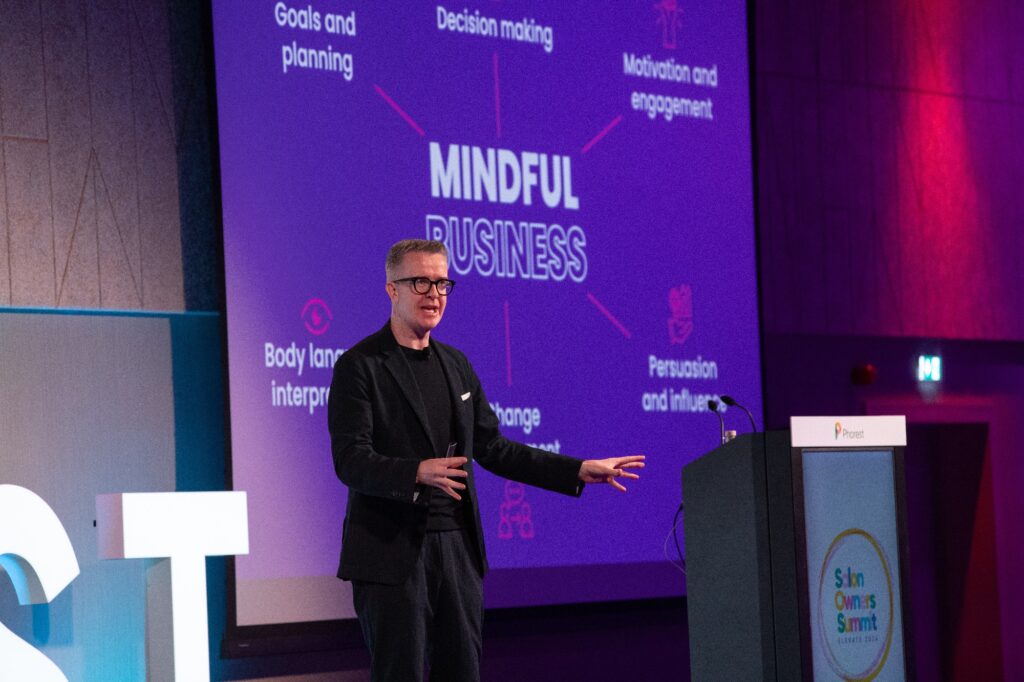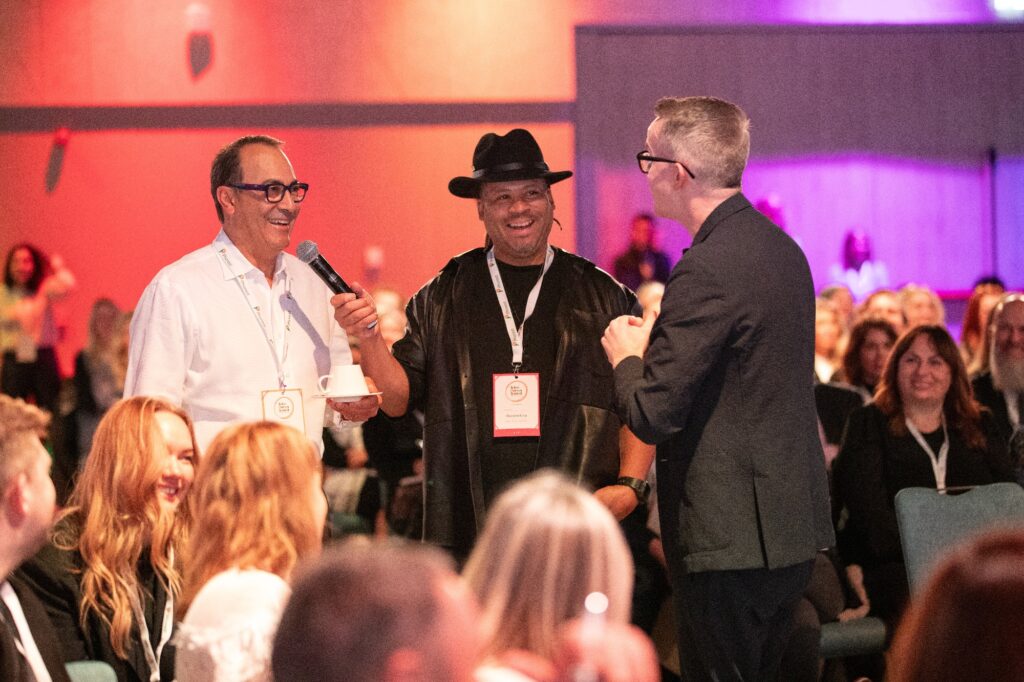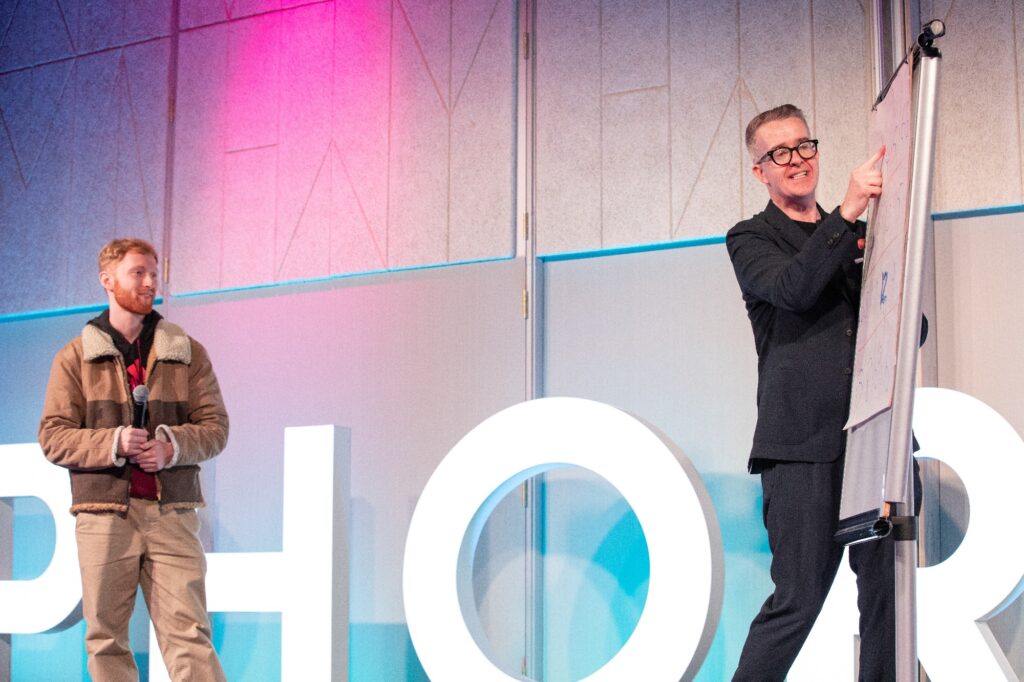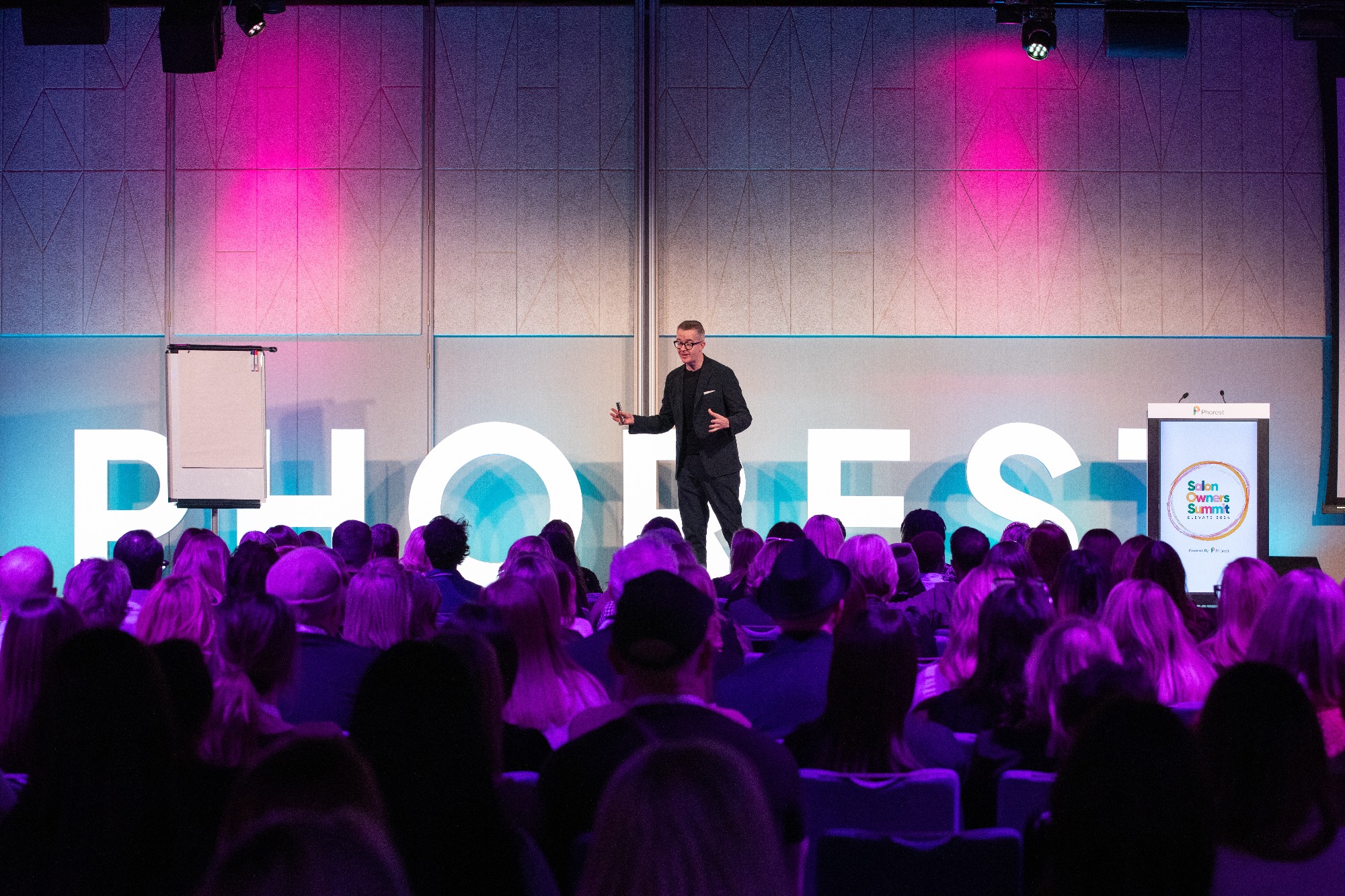David Meade, renowned organizational facilitator, business coach, researcher, and broadcaster, blew the crowd away at the 2024 Salon Owners Summit. Meade shared insights on growing great teams, with plenty of audience participation, games, and mind-bending magic thrown in for good measure.
Beginning his talk, Meade explained that his job is “looking at the small ways that we can change how we think, act, and behave… showing you how that change can skyrocket results.” Inspired by psychological theory, Meade’s advice is easy to implement and practical.
Starting the session, Meade asked the audience, “Two team members can be working in the same salon, with the same products, the same clients, and leads coming through the doors for many years. But for some reason, they perform dramatically differently. What is it that separates them?” the answer, Meade explained, is motivation and persuasion. One of the best ways to persuade your team to perform well is to implement “mindful business skills.”
Using Mindful Business Skills to Supercharge Growth

“Mindful Business Skills” are soft skills that form the basis of successful business ownership and, more importantly, high-performing teams. According to Meade, these include;
- Goals & Planning
- Decision-Making
- Motivation & Encouragement
- Body Language Interpretation
- Change Management
- Persuasion and Influence
While it’s not possible to change everything at once; “the minute you think you’re doing two things, you’re doing neither of those things”, understanding how to deal with change and how to drive decisions in a more persuasive manner can help those small changes stick; once you do decide to implement them. Mindful business skills are, simply put, small efforts that can create big changes in how your team and business operate.
Driving Decisions Successfully: The Power of 3
“Decisions are the oxygen of great teams, businesses, and individuals,” said Meade. Business owners make countless decisions every day. Successful business owners understand how to drive those decisions and receive buy-in from their teams and clients so that their decisions are accepted positively and result in meaningful change.
After playing a clever video of a card trick, which emphasized how important perspective is to understanding context, Meade explained that the same goes for how decisions are presented. In order to get a team on board with making a decision, you must present it in an enticing way. “The science of a great decision starts with a challenge,” he says, saying that if you want someone to agree with your pre-determined decision, you should present it within a series of options. People like to have choices and don’t like to feel boxed in.
“Where should you place the desired outcome in a list of options?” asked Meade, to an engaged audience. After some back and forth, he unveils that if you were to place the desired outcome as number 3 on a list, the person is 300% more likely to choose it. Why is this?
It’s simple psychology…
- Number 1 will rarely be chosen, as it’s an instant disappointment and rarely aligns with their preconceived notion of the solution.
- Number 2 acts as a point of education, where your peer will use it to understand better what you’re talking about.
- Number 3 is the “sweet spot,” where your peer is more convinced and most receptive. This is the best spot to place your “best decision” for the highest success rate.
By the time someone begins reading options 4 or 5, they’re tuning out; only remembering between 3-6% of what is mentioned in these points. This is because the human brain can only store up to 3 pieces of information simultaneously.
The Art of Persuasion: Benefits vs Loss Aversion

When convincing your team to accept decisions and embrace change, persuasion skills are vital. On this, Meade asked the audience whether they thought it was more beneficial to persuade someone to do something by:
- Explaining the benefits of doing it
- Explaining the dangers involved/negative consequences of not doing it
While the crowd was divided on what the best answer was, Meade said that highlighting the risks or dangers of not doing something was far more likely to encourage action. “Bad news is 7x more likely to be remembered, retained, and acted upon,” he said.
Weaving Consumer Psychology Into Your In-Salon Practices
With this in mind, however, it’s important not to scaremonger people or make them feel as though they have no choice. To weave “bad news” psychology into a salon business without upsetting clients or encouraging your team to speak negatively, he advised:
- Encouraging clients to book a package of treatments rather than one at a time, explaining to them that it’s more expensive to book one at a time
- Upselling a product by explaining that, although it may be a little more expensive than supermarket shampoo/conditioner/skincare, the quality means that they won’t have to return to the salon as frequently, or will obtain better results
“Instead of using losses or dangers, position the benefits of avoiding the loss. If you do this, it will absolutely skyrocket your results,” Meade said.
Persuasion by Consensus: Humans are Herd Animals
Another way of persuading people to change is to be aware that we, as humans, are herd animals. People want to do what others are doing. On this, Meade recites the “hotel card” theory, explaining how hotel cards that say “Most guests choose to help the environment by re-using their towels” tested far more effective in reducing excess laundry than cards that said “please reuse towels to help the environment” or “re-using towels can help the environment.” Why? Because they subconsciously make the guest feel as though they’re doing “what’s normal” by following the crowd.
In relation to the salon industry, drawing on peoples’ innate herd mentality can help you boost referrals and client loyalty; “Why would clients choose to move to a new salon? This is the power of testimonials and reviews online, the power of feedback. The power of someone saying ‘hey, I went here, and it was really good.’ The more of those you have, and the more you share on social media, the more you can build and grow [your business].”
If you can make your salon a place where people shout about going, you will naturally see an uplift in client numbers, a boost in loyalty, and an increase in retention.
Communication Keeps Teams and Clients Engaged

Meade then explained the importance of mindful communication when leading a team. “We know that between 60-70% of employees in any given sector these days are considering leaving to go and do something else” he said to a nodding audience. “They feel disengaged, they don’t feel like they’re part of something… so I want to talk about how some simple communication changes with your people can create a growth mindset in them.”
Meade begins with an anecdote about a factory struggling with high lighting costs. When workers couldn’t propose cost-cutting ideas, management quietly reduced the lighting intensity by 10% without informing them. Due to initial concerns that this reduction in lighting could cause health or productivity issues, consistent check-ins were conducted to ensure workers’ comfort. During this time, the workers had an 11% increase in productivity, even with the reduced lighting intensity!
Why was this? It was because the employees felt valued and respected due to the daily check-ins, fostering a closer relationship between management and staff for a happier and more motivated team. This is the power of communication and genuine care.
Bringing this point back to the salon industry, Meade explained the importance of honest, transparent, and regular communication with your team; “once we truly know and understand who we’re working with, it changes everything. It lights a torch underneath [your team], and growth becomes so much easier in that context.” Great communication can help your team ride out even the toughest storms.
Running Toward Success Without Fear
Nearing the end of his talk, Meade noted that while having all the tools and tips for growth available to you is an advantage, the only way to grow successfully is to implement them and run at challenges without fear. Illustrating his point, he brings up the story of Cliff Young, a 64-year-old Australian farmer who ran and won an Ultra-Marathon without any training. How? Because he just kept running without fears about hydration or muscle exhaustion that were on the minds of his competitors, who were following the marathon training playbook.
“When you’re facing uncertainty,” said Meade, “there isn’t always a rule book or a formula to follow. All you can do is run toward that challenge.” Even if you don’t have the tools, training, or experience, trying will bring you further than any self-limiting belief will. “Our job as leaders is to widen the circle of self-belief instead of shrinking it.”
Want to hear more from David Meade?
Listen to his chat with PhorestFM host Alex on the PhorestFM podcast below!
Feeling the Salon Owners Summit FOMO?
Want to make sure you’re in the room to hear insightful talks like this next year? Get your tickets for the next Salon Owners Summit!
Keep Learning from the Experts
Read more of the 2024 Salon Owners Summit Recaps.



